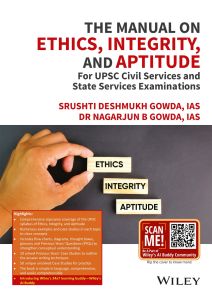Part A: Introduction
- How to Use this Book?
- Answer Writing Strategy for Part A
Unit 1: Ethics and Human Interface
- Ethics and Human Interface
- Dimensions of Ethics
- Determinants of Ethics
- Consequences of Ethics
- Ethics in Private and Public Relationships
- Ethics in Private Relationships
- Ethics in Public Relationships
- Professional Ethics
- Other Dimensions in Applied Ethics
- Human Values
- Values
- Role of Family, Society, and Education in Inculcating Values
Unit 2: Attitude—Content, Structure, and Functions
- Attitude—Content, Structure, and Functions
- Attitude
- Structure and Content of Attitude
- Properties of Attitude
- Functions of Attitude
- Attitude Formation
- Attitude and Behaviour
- Moral Attitude
- Political Attitude
- Social Influence and Persuasion
- Social Influence
- Persuasion
- Persuasion Skills
Unit 3: Aptitude and Foundational Values for Civil Service
- Aptitude and Foundational Values for Civil Service
- Aptitude
- Foundational Values for Civil Service
- Non-Partnership
- Impartiality
- Objectivity
- Tolerance
- Dedication to Public Service
- Empathy
- Compassion towards Weaker Sections
- Other Significant Values for Civil Servants
- Efficiency
- Accountability
- Courage
- Other Skills and Competencies
Unit 4: Emotional Intelligence—Concept, Utility and Application
- Emotional Intelligence—Concepts, Utilities, and Application
- Emotions
- Intelligence
- Emotional Intelligence (EI): The Concept
- Importance and Utility of Emotional Intelligence in Governance and Administration
Unit 5: Thinkers, Philosophers, Leaders, and Reformers
- Contributions of Moral Thinkers and Philosophers from India and the World to the Concepts of Morality
- Contributions of Thinkers and Philosophers
- Thinkers from Around the World
- Thinkers from India
- Lessons from the Lives and Teachings of Great Leaders, Reformers, and Administrators
- Lessons from the Lives and Teachings of Great Leaders
- Lessons from the Lives and Teachings of Reformers
- Lessons from the Lives and Teachings of Administrators
Unit 6: Ethics in Public Administration
- Ethics in Public Administration
- Ethics in Public Administration
- Importance of Ethics in Public Administration
- Ethical Concerns and Dilemmas in Government Institutions
- Ethical Concerns and Dilemmas in Private Institutions
- Strategies for Ethical Action
- Laws, Rules, Regulations, and Conscience as Sources of Ethical Guidance
- Accountability and Ethical Governance
- Governance
- Strengthening Ethical and Moral Values in Governance
- Ethical Issues in International Relations and Funding
- Ethical Issues in International Relations and Funding
- Environmental Issues
- Security Issues
- Ethical Issues in International Funding
- Corporate Governance
- Corporate Governance
- Corporate Social Responsibility
- Business Ethics
Unit 7: Probity in Governance
- Probity in Governance
- Concept of Public Service
- Philosophical Basis of Governance and Probity
- Information Sharing and Transparency in the Government
- Information Sharing and Transparency in the Government
- Right to Information
- Codes and Charters
- Code of Ethics
- Code of Conduct
- Citizens’ Charter
- Work Culture, Quality of Service Delivery, and Utilisation of Public Funds
- Work Culture
- Quality of Service Delivery
- Utilisation of Public Funds
- Challenges of Corruption
Part B: Introduction to Case Studies
- How to Write Answer for Part B?
Unit 1: Solved Case Studies
- UPSC CSE Main 2023
- UPSC CSE Main 2022
- UPSC CSE Main 2021
- UPSC CSE Main 2020
- UPSC CSE Main 2019
- UPSC CSE Main 2017
Unit 2: Practice Case Studies
Work Culture
Corporate Governance
Corruption Cases
Environment versus Development
Police-Related Cases
Marginalised Sections
Media and Ethics
Role-Based Case Studies
Miscellaneous


